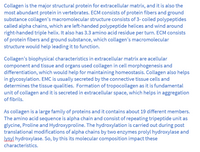
Human Anatomy & Physiology (11th Edition)
11th Edition
ISBN: 9780134580999
Author: Elaine N. Marieb, Katja N. Hoehn
Publisher: PEARSON
expand_more
expand_more
format_list_bulleted
Question
edit any part that is wrong

Transcribed Image Text:Collagen is the major structural protein for extracellular matrix, and it is also the
most abundant protein in vertebrates. ECM consists of protein fibers and ground
substance collagen's macromolecular structure consists of 3- coiled polypeptides
called alpha chains, which are left-handed polypeptide helices and wind around
right-handed triple helix. It also has 3.3 amino acid residue per turn. ECM consists
of protein fibers and ground substance, which collagen's macromolecular
structure would help leading it to function.
Collagen's biophysical characteristics in extracellular matrix are acellular
component and tissue and organs used collagen in cell morphogenesis and
differentiation, which would help for maintaining homeostasis. Collagen also helps
in glycosylation. EMC is usually secreted by the connective tissue cells and
determines the tissue qualities. Formation of tropocollagen as it is fundamental
unit of collagen and it is secreted in extracellular space, which helps in aggregation
of fibrils.
As collagen is a large family of proteins and it contains about 19 different members.
The amino acid sequence is alpha chain and consist of repeating tripeptide unit as
glycine, Proline and Hydroxyproline. The hydroxylation is carried out during post
translational modifications of alpha chains by two enzymes prolyl hydroxylase and
lysyl hydroxylase. So, by this its molecular composition impact these
characteristics.
Expert Solution
This question has been solved!
Explore an expertly crafted, step-by-step solution for a thorough understanding of key concepts.
This is a popular solution
Trending nowThis is a popular solution!
Step by stepSolved in 4 steps

Knowledge Booster
Learn more about
Need a deep-dive on the concept behind this application? Look no further. Learn more about this topic, biology and related others by exploring similar questions and additional content below.Similar questions
- W = 5-67 Home File 70 Paste |LI SALAAAAAAA Cut E Copy H Page: 1 of 1 Clipboard Insert Page Layout Format Painter Cambria 12 Words: 160 B English Type here to search References Á A BIU Uabe X₂ X² Font T Mailings Aa Aal Review e. O View jo SEEN↓ ¶ AaBbCc[ AaBbCc[ AaBBC AaBb AaBbccc AaB AaBb Ccl AaBb CcD; AaBb CcD₁ AaBb CcD AaBb CcDc 1 Normal 1 No Spaci... Heading 1 Heading 2 Heading 3 Title Subtitle Subtle Em... Emphasis Intense E... Strong Paragraph 1 Pre-Lab #4 - Microsoft Word 2 31 4 Equilibrium (balance and body position). 3 3. The optic nerve carries the special sense of 4. The vestibulocochlear nerve carries the special senses of and 5. The olfactory nerves carry the special sense of through the ,C prime video I of the ethmoid bone. W C Styles 5 5 6.s・・・ 7. I I I and extend 7°C Sunny АА Change Styles BR> = 140% - Co (4) ENG G 0 x Find ab Replace час Select Editing □ 8:07 AM 9/29/2022 E V +arrow_forwardThe second page is also related to the first-page queation.arrow_forwardA docs.google.com/document/d/16GJAAB_s3z.. Mee EApps M Gmail O YouTube Translate Bb Welcome, Kawtha... itled document ☆田。 Edit View Insert Format Tools Add-ons Help Last edit was s... 100% Normal text Verdana 10 + ... 3 1 what is the purpose of the specialized garments worn by those individuals who have sustained a second degree burn?|arrow_forward
arrow_back_ios
arrow_forward_ios
Recommended textbooks for you
 Human Anatomy & Physiology (11th Edition)BiologyISBN:9780134580999Author:Elaine N. Marieb, Katja N. HoehnPublisher:PEARSON
Human Anatomy & Physiology (11th Edition)BiologyISBN:9780134580999Author:Elaine N. Marieb, Katja N. HoehnPublisher:PEARSON Biology 2eBiologyISBN:9781947172517Author:Matthew Douglas, Jung Choi, Mary Ann ClarkPublisher:OpenStax
Biology 2eBiologyISBN:9781947172517Author:Matthew Douglas, Jung Choi, Mary Ann ClarkPublisher:OpenStax Anatomy & PhysiologyBiologyISBN:9781259398629Author:McKinley, Michael P., O'loughlin, Valerie Dean, Bidle, Theresa StouterPublisher:Mcgraw Hill Education,
Anatomy & PhysiologyBiologyISBN:9781259398629Author:McKinley, Michael P., O'loughlin, Valerie Dean, Bidle, Theresa StouterPublisher:Mcgraw Hill Education, Molecular Biology of the Cell (Sixth Edition)BiologyISBN:9780815344322Author:Bruce Alberts, Alexander D. Johnson, Julian Lewis, David Morgan, Martin Raff, Keith Roberts, Peter WalterPublisher:W. W. Norton & Company
Molecular Biology of the Cell (Sixth Edition)BiologyISBN:9780815344322Author:Bruce Alberts, Alexander D. Johnson, Julian Lewis, David Morgan, Martin Raff, Keith Roberts, Peter WalterPublisher:W. W. Norton & Company Laboratory Manual For Human Anatomy & PhysiologyBiologyISBN:9781260159363Author:Martin, Terry R., Prentice-craver, CynthiaPublisher:McGraw-Hill Publishing Co.
Laboratory Manual For Human Anatomy & PhysiologyBiologyISBN:9781260159363Author:Martin, Terry R., Prentice-craver, CynthiaPublisher:McGraw-Hill Publishing Co. Inquiry Into Life (16th Edition)BiologyISBN:9781260231700Author:Sylvia S. Mader, Michael WindelspechtPublisher:McGraw Hill Education
Inquiry Into Life (16th Edition)BiologyISBN:9781260231700Author:Sylvia S. Mader, Michael WindelspechtPublisher:McGraw Hill Education

Human Anatomy & Physiology (11th Edition)
Biology
ISBN:9780134580999
Author:Elaine N. Marieb, Katja N. Hoehn
Publisher:PEARSON

Biology 2e
Biology
ISBN:9781947172517
Author:Matthew Douglas, Jung Choi, Mary Ann Clark
Publisher:OpenStax

Anatomy & Physiology
Biology
ISBN:9781259398629
Author:McKinley, Michael P., O'loughlin, Valerie Dean, Bidle, Theresa Stouter
Publisher:Mcgraw Hill Education,

Molecular Biology of the Cell (Sixth Edition)
Biology
ISBN:9780815344322
Author:Bruce Alberts, Alexander D. Johnson, Julian Lewis, David Morgan, Martin Raff, Keith Roberts, Peter Walter
Publisher:W. W. Norton & Company

Laboratory Manual For Human Anatomy & Physiology
Biology
ISBN:9781260159363
Author:Martin, Terry R., Prentice-craver, Cynthia
Publisher:McGraw-Hill Publishing Co.

Inquiry Into Life (16th Edition)
Biology
ISBN:9781260231700
Author:Sylvia S. Mader, Michael Windelspecht
Publisher:McGraw Hill Education